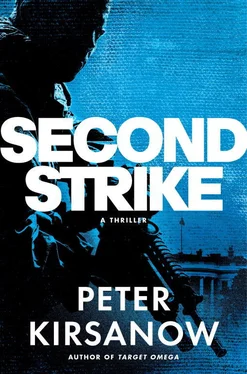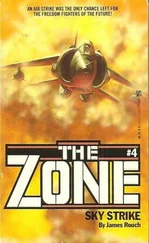Garin’s intention was not to overtake Bor, presuming that was even possible at this point. It was to evade arrest and detention by the police, something that would take him out of play and thereby virtually ensure the success of Bor’s mission.
Garin raced down Clarendon, light bar flashing, until he was confident he’d put sufficient distance between himself and the scene of the shootout. He needed to abandon the stolen cruiser before he was intercepted. A quarter mile in front of him was another intersection, three cars stopped at the red light. He swerved around and in front of them, blocking their path. Then he got out of the car with his SIG leveled menacingly at the driver of the lead vehicle and motioned for him to get out. The panicked-looking middle-aged man complied instantly, his hands raised over his head. Garin slid into the driver’s seat of the maroon Ford Fusion and proceeded in the direction of Reagan National. A simple calculation to increase the odds. He had no hope of reacquiring Bor, but he knew the assassin was eventually headed toward Reagan National or Dulles. The odds of intercepting him there were better.
Garin picked up his cell and called Dwyer.
“Dan, Bor is likely going to Reagan or Dulles.”
“How soon?”
“Assume immediately. He and whoever is with him cannot be allowed on any—” Garin stopped speaking abruptly, interrupted by an agonizing bolt of pain that shot from his outer ear through his skull.
“Mike?”
The intensity of the pain blurred his vision. Garin clenched his jaw and composed himself. “Call Olivia on Congo’s cell. Tell her to tell the president he needs to order FBI SWAT teams ASAP to Reagan and Dulles, and to alert security at both airports.”
“What for? Won’t that tip off the mole? Tip off Bor?”
“Yes. No. No other options. We lost Bor. We’re out of time. I’ve lost Bor. There, the attack is imminent…”
Dwyer’s brow furrowed. Garin was babbling, incoherent. “Mike, what’s going on?”
The garbled response from Garin was interrupted by the noise of violent impact and the sickening sound of twisting metal.
REAGAN NATIONAL, WASHINGTON, D.C.,
AUGUST 18, 5:30 P.M. EDT
Had any of his maintenance coworkers been paying any attention to him, they’d have immediately recognized something was wrong.
The look on Hassan Ali Daar’s face was one of dread. After nearly a year of slow, painstaking preparation, the time had arrived. Almost every workday he’d bring in another small piece. Most of the time, the piece would be attached to his key ring. He’d disguised them as ornaments. Sometimes they’d festooned the bracelet he wore on his left wrist. Occasionally, one of the larger pieces would be strewn innocuously among the items in his standard-issue toolbox.
Each time, the component would pass through the scanner undetected, never even drawing a second look. Even if they had, the various unconnected items would have appeared to be inconsequential knickknacks, some obscure pieces of metal or plastic.
More than two hundred separate workdays. More than two hundred scans. A smile, a nod of acknowledgment to the screeners, then off to work down one of the concourses.
He’d get only a minute or two each day for assembly. The airport seemed perpetually busy. But a minute or two was all he needed. Spread over two hundred workdays, it amounted to several hours. More than enough. Enough to assemble two, if needed.
Late mornings were best. Air traffic, and therefore foot traffic, was lightest then. He would scan Terminal B for travelers, coworkers, and security, and when he’d assured himself he’d have a minute or two without interruption, he’d duck into the men’s room. There, he’d first peek under the stalls. It didn’t matter if one was occupied by a traveler. After all, they couldn’t see what he was doing, and even if they emerged, nothing would seem amiss. He was maintenance. He was supposed to be there. On the other hand, if he recognized the trousers of a coworker or security, he’d take a pass, deferring further assembly to another day.
One minute was all it usually took. Sometimes two. Never more than that. With a flathead screwdriver he’d remove the aluminum cover of the stainless steel waste receptacle set into the tiled wall next to the line of sinks. Behind the aluminum cover was a black plastic cover, which he’d pull away to reveal a small cavity in the wall hollowed out using the claw of his hammer.
And therein lay the assembly project. Undetected. Growing incrementally almost every workday, one piece at a time. Gradually beginning to resemble the finished project. Until one day approximately one month ago it was complete, sitting dormant, ready for use: a PP-2000 SMG submachine gun chambered for a 9×19mm round. A fierce-looking Russian cousin of the MP7, with a forty-four-round magazine capacity. It held an extra magazine in the rear acting as a stock.
Daar also stored several additional magazines with it, each loaded with armor-piercing cartridges because some of the airport’s security personnel wore vests. The ughaz hadn’t specified the rounds be armor piercing, but Daar was taking no chances. He was determined that everything be perfect. The ughaz frightened him. Not that Daar was easily frightened. Far from it. He’d grown up in the war-torn streets of Mogadishu during the brutal reign of General Mohamed Farah Aidid. Daar had seen mass slaughter and starvation on an industrial scale.
But the ughaz inspired fear on a plane of its own. Daar had witnessed him break the back of an askari who hadn’t properly followed instructions. He’d picked the poor man up as if he were a small child and slammed him across his knee. Daar vividly recalled the sickening snap of the spine, almost as loud as a gunshot. He remembered the J-shaped scar along the ughaz ’s right jawline just as vividly. The mark of the ibliisku.
So, although Daar had discharged his assignment to the letter, he remained fearful. The ughaz had called moments ago to confirm the location of the weapon. The appointed time was at hand. Untold infidels would die. Daar prayed it would be a success.
—
Taras Bor wheeled the minivan toward the parking garage at Reagan National, glancing in the rearview mirror at the five volunteers seated behind him. Their expressions were indecipherable to Bor, almost blank. Each carried a slim canvas backpack containing a laptop or tablet. Otherwise, they had no luggage. They would need none.
The assassin checked the digital clock on the dashboard. They were cutting it close, but they had sufficient time for each to navigate through the airport to the TSA checkpoint and toward their respective flights in Terminal B. The departure time for each spanned a thirty-minute window. The strike points spanned another two hours after the first plane took off.
So far, everything was proceeding according to plan. Well, everything within his realm of responsibility. He had, after all, been given the signal to execute his operation, the backup plan. That meant that the event had somehow failed, or at least been delayed.
No matter. Bor’s operation would accomplish the ultimate objective. Provided, of course, they were not thwarted by Garin.
Bor held no illusions that Garin wasn’t at that very moment doing everything he could to locate Bor and stop his operation. After all, Bor had received no word from any of the Zaslon operators he’d dispatched to intercept Garin. The probability that they would kill Garin was very good. They were in an entirely different league from most other operators: They were in an entirely different galaxy from Bulkvadze’s men. But as formidable as the Zaslon operators were, Bor knew never to dismiss his former teammate until the last shovel of dirt was thrown on his grave.
Читать дальше












